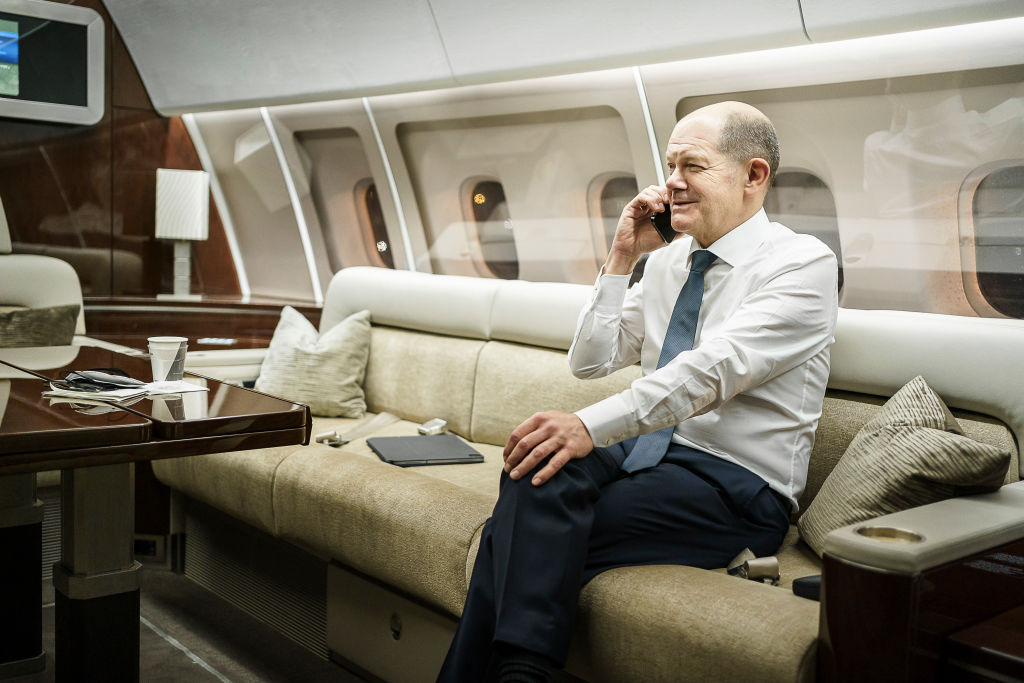It’s been nearly two years since Olaf Scholz last spoke with Vladimir Putin. Now the newspaper Zeit reports that the German Chancellor is considering a telephone call with the Russian President — a move intended to send a message to his own electorate as much as to the Kremlin.
Moscow’s answer came instantly. Putin had Scholz know that “at first glance, there seems to be no common ground [for a conversation]” and that “our relations have practically reached rock bottom and not because of our initiative”. But the deafening nyet from Moscow hasn’t stopped Scholz from making his point in Germany: he wants peace.
The restyling of Scholz from war leader to peace chancellor is in full swing. While emphasising that Germany will continue to support Ukraine “for as long as it takes”, Scholz’s coalition has recently decided on severe cuts to its aid for Kyiv and his party ran its European election campaign explicitly on a peace message.
Scholz is undoubtedly hoping to draw voters back to his beleaguered Social Democratic Party (SPD), which is currently languishing in third place in many polls. As the recent regional elections in three of Germany’s 16 states have shown, there is a sizeable proportion of the electorate that opposes further support for Ukraine. In all three states, the far-Right Alternative für Deutschland (AfD) gained nearly a third of the vote while the Left-wing populist Alliance Sahra Wagenknecht (BSW) gained over 10% in each despite being a brand new party. Both ran on Russia-friendly manifestos.
The argument that pre-war relations between Germany and Russia should be restored is more deeply entrenched in the former East Germany, where the recent elections took place, but it is also widespread across the country where it is usually dressed up as pacifism.
One recent survey indicated that the vast majority of Germans want peace negotiations and that this is an election-deciding issue for 52% of voters in the East and 41% in the West. The survey should be taken with a pinch of salt since it was commissioned by the feminist magazine Emma, which has strongly argued against weapon deliveries to Ukraine since the Russian invasion in 2022, but it is indicative of the public mood swing that Scholz wants to tap into.
The Chancellor has lost much support in his own party due to his dire approval ratings. Surveys have indicated that only a third of SPD members want him to run again for the position. There are many powerful figures in the party who have called for a softer stance of Russia, such as Rolf Mützenich, chairman of the SPD’s parliamentary group, who earlier this year suggested “freezing” the war in Ukraine.
The SPD historically has a deep attachment to Russia — most prominently exemplified by its former chancellor Gerhard Schröder, who is a close friend of Putin’s and has worked for Russian energy companies since leaving office. Schröder continues to see a role as a peacemaker for himself, as he recently outlined.
Scholz will be keenly aware that he is running out of time if he wants to take the mantle of “honest broker” — a role many German chancellors have loved since Otto von Bismarck declared in the 19th century that the secret of politics was to “make a good treaty with Russia”. In theory, Scholz has nearly a year until the next federal election. In practice, though, his deeply divided coalition may fall much sooner — according to rumours in Berlin, possibly even before the year is out.
Whether Putin will actually speak with Scholz or not, the German public can expect more conflicting rhetoric from the Chancellor on Ukraine. On Wednesday, as news emerged regarding Scholz’s planned telephone call with Moscow, he said that the Russian President “mustn’t bank on the idea that support for Ukraine will just dry up one day and that he can gobble up the whole country”.
Scholz’s dove-and-hawk ambiguity is intended to rally an increasingly polarised German public, but what is intended to please everyone often ends up pleasing no one.











Join the discussion
Join like minded readers that support our journalism by becoming a paid subscriber
To join the discussion in the comments, become a paid subscriber.
Join like minded readers that support our journalism, read unlimited articles and enjoy other subscriber-only benefits.
Subscribe